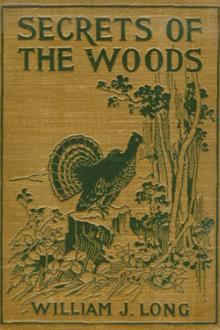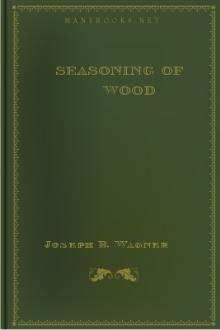Secret of the Woods, William J. Long [spiritual books to read TXT] 📗

- Author: William J. Long
- Performer: -
Book online «Secret of the Woods, William J. Long [spiritual books to read TXT] 📗». Author William J. Long
Curiously enough, the rule of the salmon fishermen prevailed here in the wilderness: no two rods shall whip the same pool at the same time. I would see an otter lying ready on the ice, evidently waiting for the chase to end. Then, as another otter slid out beside him with his fish, in he would go like a flash and take his turn. For a while the pool was a lively place; the bubbles had no rest. Then the plunges grew fewer and fewer, and the otters all disappeared into the ice caverns.
What became of them I could not make out; and I was too chilled to watch longer. Above and below the pool the stream was frozen for a distance; then there was more open water and more fishing.
Whether they followed along the bank under cover of the ice to other pools, or simply slept where they were till hungry again, I never found out. Certainly they had taken up their abode in an ideal spot, and would not leave it willingly. The open pools gave excellent fishing, and the upper ice shelf protected them perfectly from all enemies.
Once, a week later, I left the caribou and came back to the spot to watch awhile; but the place was deserted. The black water gurgled and dimpled across the pool, and slipped away silently under the lower edge of ice undisturbed by strings of silver bubbles. The ice caverns were all dark and silent. The mink had stolen the fish heads, and there was no trace anywhere to show that it was Keeonekh’s banquet hall.
The swimming power of an otter, which was so evident there in the winter pool, is one of the most remarkable things in nature. All other animals and birds, and even the best modeled of modern boats, leave more or less wake behind them when moving through the water. But Keeonekh leaves no more trail than a fish. This is partly because he keeps his body well submerged when swimming, partly because of the strong, deep, even stroke that drives him forward. Sometimes I have wondered if the outer hairs of his coat—the waterproof covering that keeps his fur dry, no matter how long he swims—are not better oiled than in other animals, which might account for the lack of ripple. I have seen him go down suddenly and leave absolutely no break in the surface to show where he was. When sliding also, plunging down a twenty-foot clay bank, he enters the water with an astonishing lack of noise or disturbance of any kind.
In swimming at the surface he seems to use all four feet, like other animals. But below the surface, when chasing fish, he uses only the forepaws. The hind legs then stretch straight out behind and are used, with the heavy tail, for a great rudder. By this means he turns and doubles like a flash, following surely the swift dartings of frightened trout, and beating them by sheer speed and nimbleness.
When fishing a pool he always hunts outward from the center, driving the fish towards the bank, keeping himself within their circlings, and so having the immense advantage of the shorter line in heading off his game. The fish are seized as they crouch against the bank for protection, or try to dart out past him.
Large fish are frequently caught from behind as they lie resting in their spring-holes. So swift and noiseless is his approach that they are seized before they become aware of danger.
This swimming power of Keeonekh is all the more astonishing when one remembers that he is distinctively a land animal, with none of the special endowments of the seal, who is his only rival as a fisherman. Nature undoubtedly intended him to get his living, as the other members of his large family do, by hunting in the woods, and endowed him accordingly. He is a strong runner, a good climber, a patient tireless hunter, and his nose is keen as a brier. With a little practice he could again get his living by hunting, as his ancestors did. If squirrels and rats and rabbits were too nimble at first, there are plenty of musquash to be caught, and he need not stop at a fawn or a sheep, for he is enormously strong, and the grip of his jaws is not to be loosened.
In severe winters, when fish are scarce or his pools frozen over, he takes to the woods boldly and shows himself a master at hunting craft. But he likes fish, and likes the water, and for many generations now has been simply a fisherman, with many of the quiet lovable traits that belong to fishermen in general.
That is one thing to give you instant sympathy for Keeonekh—he is so different, so far above all other members of his tribe. He is very gentle by nature, with no trace of the fisher’s ferocity or the weasel’s bloodthirstiness. He tames easily, and makes the most docile and affectionate pet of all the wood folk. He never kills for the sake of killing, but lives peaceably, so far as he can, with all creatures. And he stops fishing when he has caught his dinner. He is also most cleanly in his habits, with no suggestion whatever of the evil odors that cling to the mink and defile the whole neighborhood of a skunk. One cannot help wondering whether just going fishing has not wrought all this wonder in Keeonekh’s disposition. If so, ‘t is a pity that all his tribe do not turn fishermen.
His one enemy among the wood folk, so far as I have observed, is the beaver. As the latter is also a peaceable animal, it is difficult to account for the hostility. I have heard or read somewhere that Keeonekh is fond of young beaver and hunts them occasionally to vary his diet of fish; but I have never found any evidence in the wilderness to show this. Instead, I think it is simply a matter of the beaver’s dam and pond that causes the trouble.
When the dam is built the beavers often dig a channel around either end to carry off the surplus water, and so prevent their handiwork being washed away in a freshet. Then the beavers guard their preserve jealously, driving away the wood folk that dare to cross their dam or enter their ponds, especially the musquash, who is apt to burrow and cause them no end of trouble. But Keeonekh, secure in his strength, holds straight through the pond, minding his own business and even taking a fish or two in the deep places near the dam. He delights also in running water, especially in winter when lakes and streams are mostly frozen, and in his journeyings he makes use of the open channels that guard the beavers’ work. But the moment the beavers hear a splashing there, or note a disturbance in the pond where Keeonekh is chasing fish, down they come full of wrath. And there is generally a desperate fight before the affair is settled.
Once, on a little pond, I saw a fierce battle going on out in the middle, and paddled hastily to find out about it. Two beavers and a big otter were locked in a death struggle, diving, plunging, throwing themselves out of water, and snapping at each other’s throats.
As my canoe halted the otter gripped one of his antagonists and went under with him. There was a terrible commotion below the surface for a few moments. When it ended the beaver rolled up dead, and Keeonekh shot up under the second beaver to repeat the attack. They gripped on the instant, but the second beaver, an enormous fellow, refused to go under where he would be at a disadvantage. In my eagerness I let the canoe drift almost upon them, driving them wildly apart before the common danger. The otter held on his way up the lake; the beaver turned towards the shore, where I noticed for the first time a couple of beaver houses.
In this case there was no chance for intrusion on Keeonekh’s part. He had probably been attacked when going peaceably about his business through the lake.
It is barely possible, however, that there was an old grievance on the beavers’ part, which they sought to square when they caught Keeonekh on the lake. When beavers build their houses on the lake shore, without the necessity for making a dam, they generally build a tunnel slanting up from the lake’s bed to their den or house on the bank. Now Keeonekh fishes under the ice in winter more than is generally supposed. As he must breathe after every chase he must needs know all the air-holes and dens in the whole lake. No matter how much he turns and doubles in the chase after a trout, he never loses his sense of direction, never forgets where the breathing places are. When his fish is seized he makes a bee line under the ice for the nearest place where he can breathe and eat. Sometimes this lands him, out of breath, in the beaver’s tunnel; and the beaver must sit upstairs in his own house, nursing his wrath, while Keeonekh eats fish in his hallway; for there is not room for both at once in the tunnel, and a fight there or under the ice is out of the question. As the beaver eats only bark—the white inner layer of “popple” bark is his chief dainty—he cannot understand and cannot tolerate this barbarian, who eats raw fish and leaves the bones and fins and the smell of slime in his doorway. The beaver is exemplary in his neatness, detesting all smells and filth; and this may possibly account for some of his enmity and his savage attacks upon Keeonekh when he catches him in a good place.
Not the least interesting of Keeonekh’s queer ways is his habit of sliding down hill, which makes a bond of sympathy and brings him close to the boyhood memories of those who know him.
I remember one pair of otters that I watched for the better part of a sunny afternoon sliding down a clay bank with endless delight. The slide had been made, with much care evidently, on the steep side of a little promontory that jutted into the river.
It was very steep, about twenty feet high, and had been made perfectly smooth by much sliding and wetting-down. An otter would appear at the top of the bank, throw himself forward on his belly and shoot downward like a flash, diving deep under water and reappearing some distance out from the foot of the slide. And all this with marvelous stillness, as if the very woods had ears and were listening to betray the shy creatures at their fun. For it was fun, pure and simple, and fun with no end of tingle and excitement in it, especially when one tried to catch the other and shot into the water at his very heels.
This slide was in perfect condition, and the otters were careful not to roughen it. They never scrambled up over it, but went round the point and climbed from the other side, or else went up parallel to the slide, some distance away, where the ascent was easier and where there was no danger of rolling stones or sticks upon the coasting ground to spoil its smoothness.
In winter the snow makes





Comments (0)